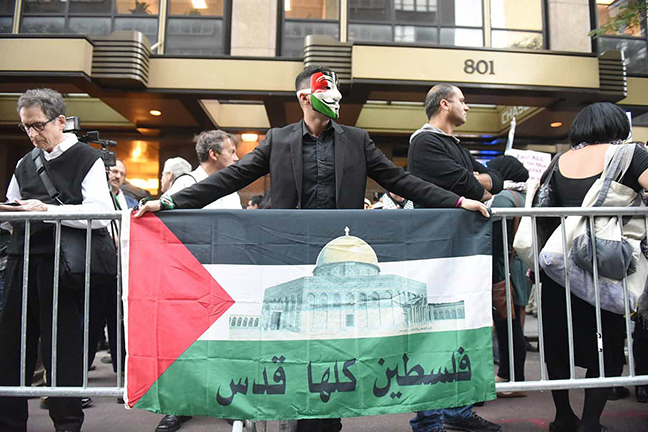Florida takes lead as universities probe SJP for support of terrorism

Flags held at a prior “Day of Rage” attended by Students for Justice in Palestine and other anti-Israel organizations. Credit: A Katz/Shutterstock.
From JNS and staff reports
With increasingly virulent and violent rhetoric emanating from anti-Israel rallies, generally billed as events of solidarity with Gaza, the state of Florida is pushing back.
Ray Rodrigues, chancellor of the State University System of Florida, has told public institutions in the state to shutter Students for Justice in Palestine chapters on their campuses, noting that it is a felony under Florida law to “knowingly provide material support” to designated terrorist organizations.
The Oct. 24 letter to the state’s 12 university presidents included a message that SJP chapters “must be deactivated” based on the national organization’s support of terrorism.
Two days later, the Anti-Defamation League and the Louis D. Brandeis Center for Human Rights Under Law sent a letter to 200 university presidents, urging the universities investigate their SJP chapters for providing “vocal and potentially material support to Hamas, a designated Foreign Terrorist Organization.”
Dozens of national Jewish groups, campus organizations and legislators have also called on university presidents to withdraw recognition of SJP chapters.
Rodrigues’ letter stated that National Students for Justice in Palestine had released a “toolkit” leading up to a Day of Resistance on Oct. 12,” in which it “refers to ‘Operation Al-Aqsa Flood’ as ‘the resistance’ and unequivocally states: ‘Palestinian students in exile are part of this movement, not in solidarity with this movement’,” Rodrigues wrote. He said that through that statement, they “affirmatively identified” themselves as part of the attack.
Hamas called its Oct. 7 terrorist attacks on Israel “Operation Al-Aqsa Flood.”
The SJP chapter at the University of Florida called the letter “disgraceful,” saying “Governor DeSantis continues to disrespect American values such as freedom of speech to extend his political power. To bend the law in this manner shows the utmost disrespect not only to any pro-Palestinian organization, but also to anyone who truly cares for political freedom and freedom of speech.”
In addition to the University of Florida, there is a chartered SJP at South Florida. There are also groups at Florida State and Florida International.
Rodrigues wrote that the “student chapters may form another organization that complies with Florida state statutes and university policies,” Rodrigues wrote. “The two institutions should grant these two chapters a waiver for the fall deadlines, should reapplication take place.”
The University of Florida said it was evaluating student organizations’ affiliations with SJP, and whether any members have violated the law. “We protect students’ right to free speech and free assembly,” the university said in a statement, “but any formal student organization that engages in unlawful conduct… loses its registration status, and is subject to other state penalties as outlined in law.”
Rabbi Jonah Zinn of the University of Florida Hillel told the Tampa Bay Times that nationally, SJP has long “contributed to a harmful and unsafe environment for Jewish college students across the country,” and since Oct. 7 has celebrated the Hamas atrocities and called for more violence.
Studies have shown that an active SJP presence on a college campus leads to a much higher level of antisemitic activity in general.
Nationally, SJP chapters have advertised rallies using images of paragliders, which Hamas operatives used to sail over the border to perpetrate an attack on a music festival, where around 260 Israelis and foreign nationals were murdered, many in ways that their bodies could not be identified for at least a week.
Jonathan Greenblatt, CEO of the Anti-Defamation League, told Inside Higher Ed that while he did not know specifics about the Florida chapters, many SJP chapters have gone beyond what the First Amendment permits. “This full-blown support for terrorist organizations, and that kind of rhetoric and those kinds of threats are clearly antisemitic. They are violative of every norm of decency.”
AN ADL backgrounder notes that the Oct. 12 toolkit’s tone was “not just slogans and rallies, but armed confrontation with oppressors” in Israel.
Other SJP chapters have rejected the idea that any Israeli could be considered a civilian, and called for liberation “by any means necessary,” which is seen as defending the Hamas massacre.
In an Instagram post on Oct. 16, the University of Florida SJP said the university’s concerns have been “solely aimed towards those mourning the Hamas attacks” and “have not been extended to those who are feeling distraught for the people of Gaza who are facing ethnic genocide by the IDF.”
The chapter on Oct. 10 had issued a solidarity statement where they “mourn the loss of innocent Palestinian and Israeli civilian life” and said “the root of violence, apartheid and occupation under Israel’s far-right government must end for peace.” The statement then continued with “full support of Palestinian liberation,” explaining “the resistance we are seeing today is a response to decades of oppression and inhumanity.”
Nationally, SJP has about 200 affiliates. It is active in the Boycott, Divest and Sanction movement that works for the international isolation, and ultimate destruction, of Israel. Many SJP founders, funders and leaders have been connected to groups like Hamas, Hezbollah or Islamic Jihad.
Hamas was designated a terrorist group by the U.S. State Department in 1997.
Other organizations, such as Florida State University’s Students for a Democratic Society, which commended Hamas for its “brave assault onto the Zionist entity Israel,” are still active.



